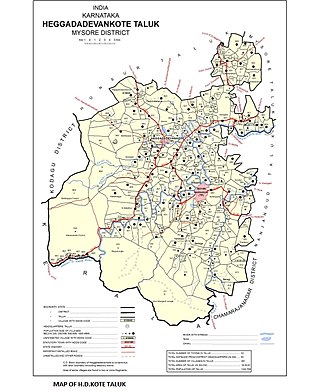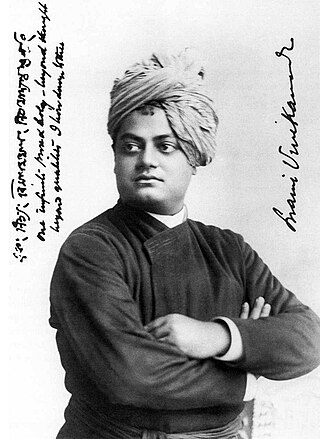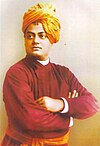
Ramakrishna Math and Ramakrishna Mission (RKM) is a spiritual and philanthropic organisation headquartered in Belur Math, West Bengal. The mission is named after the Indian Hindu spiritual guru and mystic Ramakrishna. The mission was founded by Ramakrishna's chief disciple Swami Vivekananda on 1 May 1897. The organisation mainly propagates the Hindu philosophy of Vedanta–Advaita Vedanta and four yogic ideals – Jnana, Bhakti, Karma, and Raja yoga. The mission bases its work on the principles of Karma Yoga, the principle of selfless work done with a dedication to God.

The Mata Amritanandamayi Math (MAM) is an international charitable organization aimed at the spiritual and material upliftment of humankind. It was founded by Indian spiritual leader and humanitarian Mata Amritanandamayi in 1981, with its headquarters in Paryakadavu, Alappad Panchayat, Kollam district, kerala and is also known as amritpuri

Sargur, is a small town located about 80 km from the town of Chamarajanagar And a Taluk of Mysore district of Karnataka, India. H D Kote (Heggadadevanakote) is about 12 km north of Sargur. It is 55 km from the city of Mysore. Bangalore International Airport is 200 km away. To be more elaborate, Sargur is 33.8 km from Nanjangud town (Karnataka), 35.1 km from Gundlupet town (Karnataka), 137.8 km from Udagamandalam town (Ooty) Valley and 38.8 km from Hunsur town (Karnataka).

Dr. Hanumappa Sudarshan is an Indian social worker and tribal rights activist. He is known for his contributions to the upliftment of the forest dwelling tribes in the Chamarajanagar district of Karnataka. He is also a recipient of the Right Livelihood Award and the Padma Shri.

Sri Ramakrishna Vidyashala is a residential school for boys run by the Ramakrishna Mission. It is situated in the southern Indian city of Mysore in Karnataka. It offers a comprehensive education from high school to junior college, or grades eight through twelve.

Swami Vipulananda, also known as Vipulananda Adigal, was a Sri Lankan Tamil Hindu social reformer, literary critic, author, poet, teacher and ascetic from the Eastern Province of Sri Lanka. Vipulananda was an early pioneer associated with the Indian-based Ramakrishna Mission in Sri Lanka. Along with other reformers, Vipulananda was instrumental in the revival of the Hindu religion and native traditions in Sri Lanka after a long period of dormancy and decline during the previous 500 years of colonial rule by various European powers.

Ramakrishna Mission Vivekananda Educational and Research Institute, formerly Ramakrishna Mission Vivekananda University or simply Vivekananda University, is an education institute deemed-to-be-university headquartered at Belur, West Bengal, with campuses spanning multiple states in India. Established with the idea of actualizing Swami Vivekananda's vision of education, the institute is administered by the Ramakrishna Mission. The university provides courses on subjects as varied as rural and tribal development, disability management and special education, fundamental science education and Indian cultural and spiritual heritage.

A community health worker (CHW) is a member of a community who provides basic health and medical care within their community, and is capable of providing preventive, promotional and rehabilitation care to that community, typically without formal education equal to that of a nurse, CHO, or doctor. They are chosen within the community to assist a train personnel community health extension worker who is train in college or schools of health. A community health extension worker (CHEW) is a specially trained professional who provides similar preventive, curative and rehabilitative health care and services to people where they live and work. CHEW are trained for three years and they graduate with a diploma, while the JCHEW are trained for two years and graduate with a certificate. Other terms for this type of health care provider include lay health worker, village health worker, community health aide, community health promoter, and health advisor.
AIM For Seva is a service organization in India, founded by Swami Dayananda Saraswati in 2000 to make education and healthcare accessible to children in rural areas of India. It is a non-governmental organization (NGO) in special consultative status with the United Nations Economic and Social Council. AIM for Seva is funded entirely by donations.

Ramakrishna Mission Home of Service is an Indian non-governmental organisation (NGO) located in Varanasi, established in 1900, and a branch of Ramakrishna Mission since 1902. It manages an education program on essential health issues in schools, slums and villages of Uttar Pradesh (India) thanks to auto-produced multimedia educational movies. It also gives health care and supplies free medicines to penniless people at its charitable hospital and two hospices.

Swami Vivekananda was an Indian Hindu monk. He was a key figure in the introduction of the Indian philosophies of Vedanta and Yoga to the western world. The 150th birth anniversary of Swami Vivekananda was celebrated all over India and in different countries in the world. Ministry of Youth Affairs & Sports of India decided to observe 2013 as the year of 150th Birth Anniversary of Swami Vivekananda. Year-long events and programs were organised by different branches of Ramakrishna Math, Ramakrishna Mission, central government and different state governments of India, education institutions, youth groups etc. Bengali film director Tutu (Utpal) Sinha made a film The Light: Swami Vivekananda as a tribute to Swami Vivekananda on his 150th birth anniversary. The movie was released on 23 August 2013.

The Rabha Hasong Autonomous Council (RHAC) was constituted by the Government of Assam in 1995. It was constituted for development in the areas of economic, educational, socio-cultural and ethnic identity of Rabha people residing in the council area. RHAC has different tribes such as Rabha, Bodo, Garo, Hajong etc. The majority of the population in RHAC is Rabha. Currently the RHAC head office is located at Dudhnoi, Assam. The current chief of the RHAC is Tankeswar Rabha.

The United States public policy agenda on issues affecting Native Americans under the Obama administration includes the signing of the Tribal Law and Order Act of 2010, which allowed tribal courts to extend and expand sentences handed down to them in criminal cases, strengthening tribal autonomy. Obama also supported and enforced the Executive Order 13175, which requires the federal government to consult with tribal governments when deliberating over policies and programs that would affect tribal communities. Under the Obama Administration was also the launching of Michelle Obama's program Let's Move In Indian Country, which aims to improve opportunities for physical activity, to increase access to healthy food in tribal communities, and to create collaborations between private and public sectors to build programs that will end childhood obesity in Native communities. Obama also supported tribal communities through certain provisions of the American Recovery and Reinvestment Act of 2009, which allocated $510 million for rehabilitation of Native American housing, and the settlement of the Keepseagle case, a lawsuit against the United States Department of Agriculture for discriminating against tribal communities by not allowing them equal access to the USDA Farm Loan Program. Most recently, Obama signed Executive Order 13592, which seeks to improve educational opportunities for American Indian and Alaska Natives. Obama has been praised by many tribal leaders, including those who claim he has done more for Native Americans than all of his predecessors combined.

Dr. Ramaswami Balasubramaniam, known as Dr R Balu, is a development scholar, author, public policy advocate, leadership trainer known for his development work with rural and tribal people in Saragur and Heggadadevana kote Taluks of Mysuru in Karnataka, India. He founded Swami Vivekananda Youth Movement (SVYM), a development organization based in Saragur when he was 19. He is also the founder and chairman of the Grassroots Research And Advocacy Movement (GRAAM), a public policy think tank in Mysuru. After spending 26 years in development work among rural and tribal people, he pursued academic degrees in leadership, organisational development and public policy. He was the Frank T Rhodes professor at Cornell University between 2012 and 2014, and has held academic positions in Cornell and other universities. His books Voices from the Grassroots and I, the citizen (2015) are compilation of narratives and reflections of a development expert. He published Power Within: The Leadership Legacy of Narendra Modi in 2024.

Vivekananda Global University is a private university located in Jaipur, Rajasthan in India. It was established under the Act No.11/2012 of the Government of Rajasthan.

Vivekananda Institute for Leadership Development or V-Lead is an international research and training organisation under Swami Vivekananda Youth Movement, Saragur, India.

Swami Vachanananda Guru, commonly known as Shwaasa Guru, is a yogi, social activist, philanthropist from Karnataka, India. He took sannyasa at a very tender age. He founded Shwaasa, a non-profit organization which offers yoga programs in India and around the world. The foundation conducts yoga camps and is involved in various social and community development activities creating health awareness among people irrespective of age, religion, language, and cast.

Ramakrishna Mission Ashrama, Narainpur (RKMN) is a branch centre of Ramakrishna Math and Mission in state of Chhattisgarh. It was founded on 2 August 1985 by Swami Atmananda to serve the tribals of the remote abujhmarh jungle. These tribals were mute victims of oppression and utter neglect for several centuries. The tribals, popularly known as 'Abujhmarias' have been categorised as particularly vulnerable tribal group by the government of India.
Lata Desai is a medical doctor from the Indian State of Gujarat who is 1980 along with her husband Dr. Anil Desai and a few friends founded the Society for Education Welfare and Action - Rural, a voluntary organization devoted to health and development activities in the tribal area of South Gujarat.















